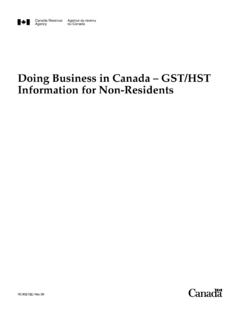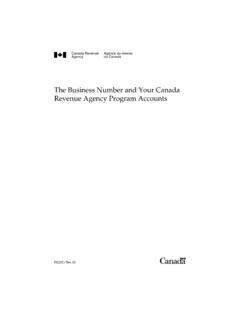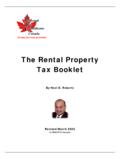Transcription of Tax Brochure 2005 - self employed members - …
1 Tax Issuesfor self - employed membersCANADIAN ACTORS EQUITY ASSOCIATION tax Issues | page 1 This briefing was developed in discussions with professional tax pre-parers who are experienced in performing arts matters. It is a generalguide intended to help you organize your affairs as you work throughthe year. The tax issues addressed are based on the tax legislation ineffect at the time of printing. Performers such as actors, dancers, singers when they are self - employed are the main focus of this briefing. Much of it may also applyto theatre directors, choreographers, stage managers, assistant stagemanagers, stunt and fight coordinators, musicians and others con-cerned with live and recorded performance if they are put, being self - employed means that you have set yourself upas a business and that expenses related to earning income may bededucted before determining your taxable income.
2 self - employed indi-viduals may also be referred to as "independent contractors" or asbeing engaged under a contract for services. All persons, both resident and non-resident earning income in Canadamust file a Canadian income tax return. Foreign artists earning incomein Canada may be required to file a Canadian tax return. artistsworking in Canada may be required to file both Canadian andAmerican returns. Canadian artists working outside Canada may berequired to file elsewhere as well as a Canadian return. Foreign artistsworking in Canada should seek professional help, and Canadian resi-dents should certainly do so before accepting work outside will deal with foreign performing artists working in Canada in a sep-arate chapter [below]. This is just general advice about filing income tax returns and is notintended to address individual circumstances or other tax liabilitiessuch as the Goods and Services Tax (GST), the Harmonized Sales Tax(HST) the Quebec Sales Tax (QST) or corporate taxes.
3 The calculationof income, expenses and taxes owing may not be a straightforwardmatter. self - employed professionals often rely on a tax professional toprepare their tax returns. You are still personally liable for what your taxreturn says, however and this briefing will help you understand what isbeing done for you. This briefing is not meant to provide the skill youtax Issues | page 2need to prepare your own income tax return. It will help you organizeyourself and should you decide to seek professional help, it will helpyour preparer to do the best job for you. Performing artists who are members of Equity and ACTRA, as well asothers in the performing arts business , are normally considered to beself- employed . Even though this is the industry standard, The CanadaRevenue Agency (CRA) has the ability to assess the status of anyengagement and based on the circumstances of the situation, make adetermination that you were or were not self - employed .
4 To be self - employed you do not need to register a business name or incorporateyourself or become a union member. According to CRA guidelines, aperforming artist who is self - employed is considered to be operating abusiness, provided there is a reasonable expectation of , such an artist is entitled to deduct reasonable expensesincurred in connection with earning income from that business , exceptto the extent they are denied or limited by provisions of the Income TaxAct . The expenses that are deductible by a self - employed performingartist are discussed ACTRA and Equity members work as employees part of the time,either doing their regular professional job or supplementing their pro-fessional income. Artists who are employees have the benefit of cov-erage by their employers for Employment Insurance and the CanadaPension Plan (CPP) by statute law.
5 Employers are legally bound tosend forms (T4s), containing the details of amounts deducted fromyour wages, to you and the CRA once a year. self - employed artists arenot covered under the Employment Insurance Act [Note: Non-paymentof EI premiums could cause denial of EI benefits]. However, you arecovered by, and must pay all the contributions required under, theCanada Pension Plan based on their net self - employed who perform services as employees in the Province of Quebeccontribute to the Quebec Pension Plan on remuneration received fromany such source. self - employed artists who reside in that province onthe last day of any year also contribute to the Quebec Pension who perform services as artists in the Province of Quebecshould consult Revenu Qu bec concerning their status under Issues | page 3In a series of successive arrangements or contracts, an artist may bean employee for a certain period and, upon termination of the contractas an employee, subsequently become self - employed .
6 In other circum-stances, an individual can be an employee under one arrangement orcontract and, over the same period of time, can be self -employedunder a second arrangement. An individual, however, cannot be bothan employee and self - employed under the same arrangement or con-tract. Many factors must be taken into consideration in establishing whetheran individual is an employee or is self - employed . The question to bedecided is whether the contract between the parties is a contract ofservice that exists between an employer and an employee, or is a con-tract for services, that is, the engagement of a self - employed contract of service generally exists if the person for whom the serv-ices are performed has the right to control the amount, the nature, andthe management of the work to be done and the manner of doing it.
7 Acontract for services also, exists when a person is engaged to achievea defined objective and is given all the freedom required to attain thedesired result. Most theatre professionals are in business on their ownaccount because they are engaged to bring a unique and creativeexpression in the development of the work, they retain control of theartistic expression and intellectual property rights, they retain the serv-ices of others such as agents and have ongoing expenses in devel-oping work opportunities. If you have any doubt as to your statusemployed or self - employed , advice can be obtained from a CRA taxservices office. However, the CRA will tend to give more weight to fac-tors leading to a conclusion of employee status.
8 For this reason andbecause of the complexities of this type of determination, a tax profes-sionla may be the best one to guide you and in turn save you a lot you or your spouse, are self - employed , your tax returns are due onJune 15, otherwise April 30 is the due date. Despite the later filing datefor self - employed individuals, interest is calculated on taxes owing forthe previous year that are not paid by April 30. Late or missing returnscan be expensive. Many tax credits can't be claimed more than threeyears after the end of the tax year, and CRA charges penalties andinterest as a percentage of tax due. It is important to realize that latefiling means penalties and interest. As well, the return will be scruti-nized individually by hand instead of computer screening. The following is a list of important tax dates for the upcoming year: 4 February 28, Final date for employers to mail T4 and T4A slips4 March 1, Final date for RRSP contributions for previous year4 March 15, Quarterly tax installment due for current year4 April 30, Final date for tax payment on previous year's tax4 June 15, Final date for submitting tax return if self -employed4 June 15, Quarterly tax installment due for current year4 September 15, Quarterly tax installment due for current year4 December 15, Quarterly tax installment due for current year4 December 31, Final date for transactions in current tax year People with self - employed income need to keep their own records,not only for the current year but for six years.
9 [eg. The CRA coulddecide to audit you in 2007 for the 2002 taxation year.] It is importantto keep your records in a manner that will allow for future all of your pay stubs and receipts into a shoe box is not thebest method. Organizing yourself from the beginning will pay off inthe future. Engagers may or may not issue a T4A to document self - employed income. Whether or not you receive a T4A, it is importantto reconcile your income. Income includes your gross fees and fringebenefits that are paid for by the engager such as a portion of theRRSP contributions or insurance premiums. In the absence of aT4A, agent's records, contracts and pay stubs prove your income can be tracked by the CRA in many differentways and penalties can be quite severe.
10 It is best to create aschedule of who paid you, how much and whether or not a T4A wasissued for that income. tax Issues | page 4tax Issues | page 5 Your " business " must have "a reasonable expectation of profit". TheCRA has been briefed on artists' income patterns, but a very lowincome, and particularly a loss, over a number of years may be inves-tigated. If you continually sustain a business loss, you may eventuallybe refused any expenses that exceed your professional income. Thisis especially likely if you have income from another job. Good record-keeping and a full professional journal or work diary, may enable youto show a sufficiently high level of business activity to continue to beallowed a business loss. Deductions for expenses may be disallowedif there isn't sufficient expense doesn't have to produce income, but that must be its inten-tion.







